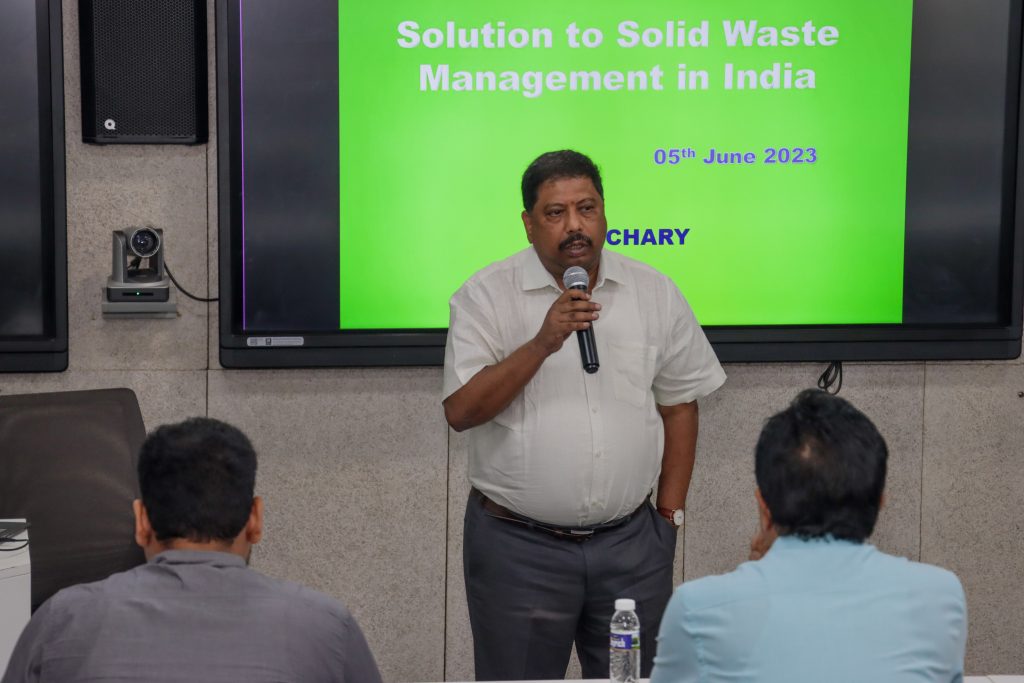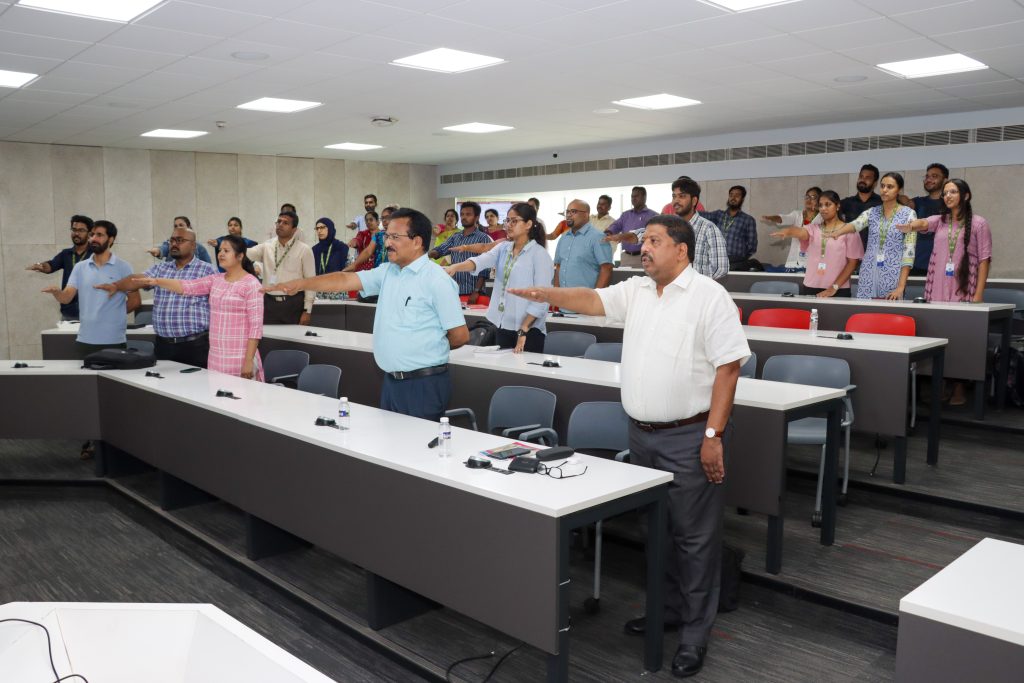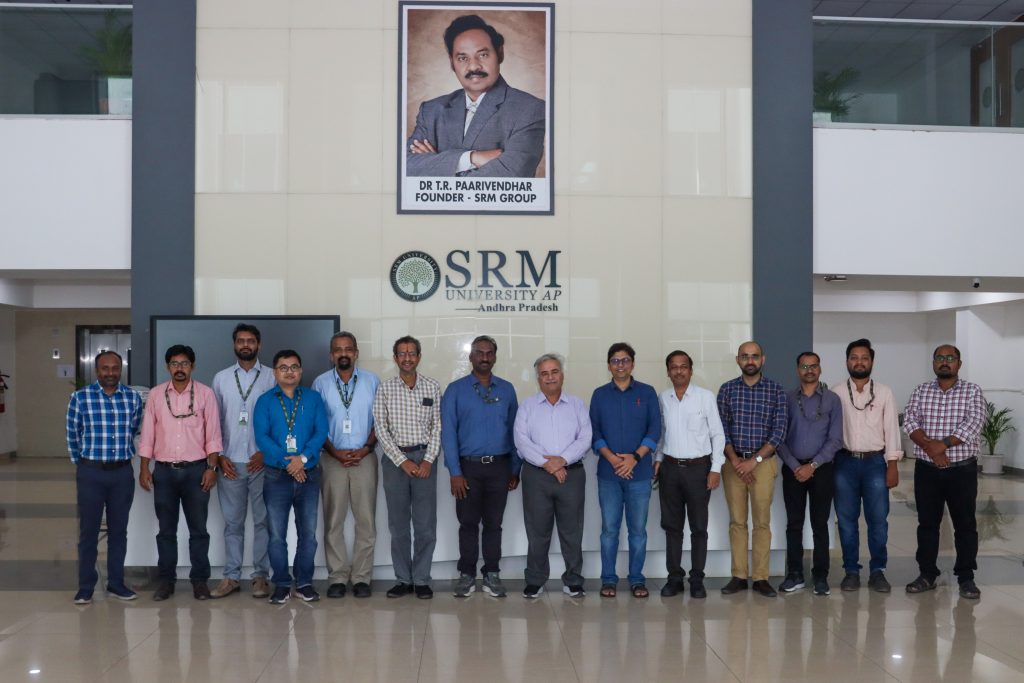Current Happenings ENVS News
- World Environment Day Celebrations – An Initiative to Beat Plastic Pollution June 27, 2023

The Department of Environmental Science and Engineering celebrated World Environment Day on June 05, 2023, initiating awareness of the need to combat the climate crisis posed by global plastic pollution. The department organised two invited lectures from industry experts to expound on the theme of World Environment Day 2023, “Solutions to Plastic Pollution”. Efficient ways to tackle plastic pollution in the country and local waste management systems and policies were key points of discussion. Prof. K V Jayakumar, Professor, Department of Civil Engineering, National Institute of Technology, Warangal and Mr M V Chary, President, Jindal Urban Waste Management, Guntur, Andhra Pradesh, were the invited speakers.
Prof. K V Jayakumar lent thought-provoking insights into the types of water and how marketing strategies sell water at high prices to consumers. He also shared his experience of his visits to other countries in Europe and Asia where water is utilised wisely. Apart from water and plastic pollution, he also addressed the pressing issue of climate change happening over the years and the consequent increase in temperature. Prof. Jayakumar also suggested the book “Silent Spring” by Rachel Carson, which is often viewed as a landmark work of environmental writing, focusing on the harmful effects of pesticides on the environment.
Mr M V Chary shared in-depth information about the Jindal Urban Waste Management at Guntur, stating the various source of waste, collection points, transportation to the Jindal Waste – Energy Plant, and how waste is converted to energy (through incineration) at the plant. Unique aspects of the plant were also discussed at length, along with a video presentation demonstrating the complete working of the plant. The interactive session with Mr Chary, wherein he shared his expertise in the industrial sector, was beneficial for the students.

A pledge was taken by all participants at the end of the seminar emphasising the importance of saving the environment, sustainable resource management and the need of awareness among all in reducing the pollution as well as global warming and climate change.
Dr Karthik Rajendran, HOD of the Department, delivered the welcome address and the event witnessed an active participation of 85 participants which constitutes Professors, Faculty, PhD Scholars, Undergraduate students from various departments. There were also faculty and scholars from neighbouring colleges such as Acharya Nagarjuna University, Sidhartha Mahila Kalasala and Ministry of Culture, New Delhi.
Continue reading → - SERB- SURE Grants: 10 projects worth 2.50 crores awarded to SRM AP May 16, 2023

The faculty of SRM University-AP have been awarded 10 projects worth 2.50 crores from the Science and Engineering Research Board (SERB-SURE). Department of Science and Technology (DST) received a total of 2000 proposals, of which 466 were sanctioned. Among the 466 projects, 151 projects were awarded to Private Universities. Of the 151 projects approved to state private universities and colleges throughout India, the five-and-a-half-year young varsity was awarded 10 projects. 10 professors from various Science and Engineering Departments brought this incredible achievement to the university.
SERB-SURE is a research grant scheme initiated by the Science and Engineering Research Board (SERB) in India to provide financial support to young researchers in the early stages of their careers. The grants are intended to support research in basic and applied sciences, engineering, and technology and is typically granted for a period of three years.The SERB-SURE scheme is one of several initiatives by SERB to promote scientific research in India and support the development of a strong research community in the country.
“It is a milestone achievement that resonates with the University’s unparalleled commitment for excellence. We are striving towards research-intensive learning to build cutting-edge innovation for a transformative tomorrow”, commented Vice Chancellor, Prof. Manoj K Arora. The Executive Director-Research of SRM Group, Prof. Narayana Rao said that, “SRM University-AP has travailed hard to achieve the world-class scientific temperament that we now advocate, and this achievement is a testimonial recognition of all our efforts.” The prestigious grants were sanctioned to the faculty in the on-going domains of Quantum Kinetic Approach, Antimicrobial Resistance (AMR) Profiling and Changing of Hydroclimatic conditions in Bay of Bengal among 7 others.
Dean-SEAS, Prof. Ranjith Thapa said, “These research could be path-breaking and could offer a solution to many of the societal difficulties.” Prof. Jayaseelan Murugaiyan, Dr Sandeep Singh and Dr Pitchaiah Cherukuri of the Department of Biological Sciences; Dr Sabyasachi Chakrabortty, Dr V S Baswanth Oruganti of the Department of Chemistry; Dr Debabrata Pramanik, Dr Ravi Kumar and Dr Pankaj Bhalla of the Department of Physics ; Dr Sandeep Kumar Verma of the Department of Mathematics; Dr Uma Maheswar Arepalli of the Department of Civil Engineering; and Dr Kousik Das of the Department of Environmental Science and Engineering were awarded the grants.
Continue reading →

